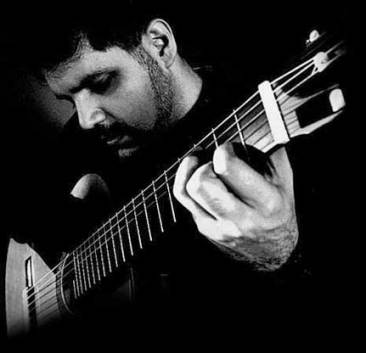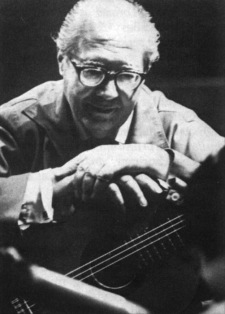By Stephen Brookes • The Washington Post • July 15, 2007
__________________________________________________________________________________
Too delicate for the orchestra, too soft-spoken for large concert halls, not quite "serious" enough for serious music, the classical guitar has lived at the outskirts of the classical music community for most of its history. The instrument is seen by many as a sort of upstart from the world of folk music. It's often consigned to the netherworld of chamber music.
Ricardo CoboBut all that may be changing. A new generation of classical guitarists has emerged over the past decade, raising performance standards and pushing the instrument into new realms. These players have embraced the instrument's eclectic roots, while writing innovative works and digging up new repertoire.
"It's dawning on people that the classical guitar is not just a passing interest, that it's not the black sheep of the solo instruments," says Ricardo Cobo, whose recordings of little-known Latin American guitar music have met with global acclaim. "It's coming into its own, and it has an enormous following."
Cobo and more than a dozen top players of the new generation will be heading to Alexandria this week for nine days of concerts and master classes at the Alexandria Guitar Festival, which has grown from a quiet get-together into one of the most vibrant and thought-provoking musical events of the summer.
Young virtuosos such as Cobo, Kenneth Meyer, William Kanengiser (of the Grammy-winning Los Angeles Guitar Quartet), Lorenzo Micheli and Matteo Mela will be performing new works, giving master classes and exchanging ideas on the future of the guitar.
tight, predictable mold is being
broken" ...
"The festival's evolving very quickly," says Nathan Fischer, who started the event in 2002 after spending a summer accompanying the Alexandria Ballet and falling for the city's old world charm.
Initially set up as a way to bring high-level instruction to local guitarists, it now includes seminars, Suzuki training for young players and a forum for showcasing new talent from around the world. "We've always had high-quality players, but it's grown to include higher and higher-level artists," Fischer says.
The audiences are growing, too. Last year's concerts at the Old Presbyterian Meeting House were packed to the rafters, prompting a move this year to the roomier Masonic Temple. It's a sign, say the players, not just of the guitar's growing popularity but of the diversity of its fans, who include everyone from Bach lovers to banjo fanatics.
"The guitar draws classical listeners, but it transcends that because the guitar is used in every genre," says Meyer, head of the guitar studies program at Syracuse University. "So you get jazz and rock and folk musicians who are curious about what's going on. They want to get back to the roots."
Those roots go back centuries -- predecessors like the lute and the vihuela were favorites of the Renaissance -- but the modern, six-stringed guitar came into being only in the late 18th century. It flourished for the next four or five decades; Franz Schubert wrote many of his lieder on the guitar (often while lying in bed, according to legend), Hector Berlioz considered it his principal instrument and the great virtuoso Nicolo Paganini was said to be as accomplished on the guitar as he was on the violin.
Andres SegoviaBut the guitar fell out of fashion later in the 19th century, and it wasn't until the 1920s that the Spanish guitarist Andrés Segovia almost single-handedly brought it back. Armed with a self-developed technique, transcriptions of Bach and an intuitive feel for the guitar's possibilities, Segovia battled his way onto the world's concert stages and established the guitar once again as a serious classical instrument.
His impact was immense; by the 1960s, music schools had begun to offer guitar programs (Baltimore's Peabody Conservatory was the first), and guitarists like Julian Bream, John Williams and Christopher Parkening were expanding on Segovia's pioneering work and commissioning important works from Benjamin Britten, Hans Werner Henze, Toru Takemitsu and other prominent composers of the day.
But some of today's players think it's time to move to the next level. "For many years Segovia was the captain of the team," Cobo says. "He set the repertory, he set the bar on performance and he made the guitar one more of the great classical solo instruments, to be played onstage like the violin or the piano. But that's not really the case anymore."
The guitar is a highly versatile instrument -- "it can be plugged in, or unplugged, you can use it in a computer setting," he notes -- and can be made of modern materials such as carbon fiber and Kevlar to make the sound project. Players like Cobo also find inspiration in the guitar's global reach: "It has roots in nearly every country in the developing world," he says. "The music of Brazil and Argentina really revolves around the guitar.
"So we're in a rare place, where all the music that was considered the bastard child of classical music is now at center stage. The tight, predictable mold is being broken."
As if to prove the point, Cobo will present some new works by little-known Cuban composers when he performs Wednesday night, Ken Meyer will be playing a new work for guitar and laptop, and non-classical players -- including flamenco guitarist Pedro Cortes and jazz guitarists Rick Whitehead and Bob Sneider -- also will be performing.
But most of the recitals will still focus on familiar guitar works by composers like Bach, Mauro Giuliani and Fernando Sor -- music that, for many, brings out the best qualities of the guitar.
"People love the subtleties of the guitar," Fischer says. "Segovia used to refer to the guitar as its own little orchestra, because of the tone possibilities, the coloring possibilities, the effects that you can do. It's as if you're being spoken to; there's something very intimate -- even captivating -- about the sound of the guitar."
Concerts at the Alexandria Guitar Festival take place every afternoon and evening from Wednesday to Saturday, and are held at the George Washington Masonic National Memorial in Alexandria. Tickets are available at Olsson's Books and Records, or online.